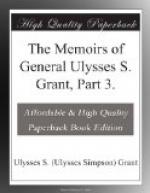Bear Creek, a few miles to the east of the Fulton road, is a formidable obstacle to the movement of troops in the absence of bridges, all of which, in September, 1862, had been destroyed in that vicinity. The Tennessee, to the north-east, not many miles away, was also a formidable obstacle for an army followed by a pursuing force. Ord was on the north-west, and even if a rebel movement had been possible in that direction it could have brought only temporary relief, for it would have carried Price’s army to the rear of the National forces and isolated it from all support. It looked to me that, if Price would remain in Iuka until we could get there, his annihilation was inevitable.
On the morning of the 18th of September General Ord moved by rail to Burnsville, and there left the cars and moved out to perform his part of the programme. He was to get as near the enemy as possible during the day and intrench himself so as to hold his position until the next morning. Rosecrans was to be up by the morning of the 19th on the two roads before described, and the attack was to be from all three quarters simultaneously. Troops enough were left at Jacinto and Rienzi to detain any cavalry that Van Dorn might send out to make a sudden dash into Corinth until I could be notified. There was a telegraph wire along the railroad, so there would be no delay in communication. I detained cars and locomotives enough at Burnsville to transport the whole of Ord’s command at once, and if Van Dorn had moved against Corinth instead of Iuka I could have thrown in reinforcements to the number of 7,000 or 8,000 before he could have arrived. I remained at Burnsville with a detachment of about 900 men from Ord’s command and communicated with my two wings by courier. Ord met the advance of the enemy soon after leaving Burnsville. Quite a sharp engagement ensued, but he drove the rebels back with considerable loss, including one general officer killed. He maintained his position and was ready to attack by daylight the next morning. I was very much disappointed at receiving a dispatch from Rosecrans after midnight from Jacinto, twenty-two miles from Iuka, saying that some of his command had been delayed, and that the rear of his column was not yet up as far as Jacinto. He said, however, that he would still be at Iuka by two o’clock the next day. I did not believe this possible because of the distance and the condition of the roads, which was bad; besides, troops after a forced march of twenty miles are not in a good condition for fighting the moment they get through. It might do in marching to relieve a beleaguered garrison, but not to make an assault. I immediately sent Ord a copy of Rosecrans’ dispatch and ordered him to be in readiness to attack the moment he heard the sound of guns to the south or south-east. He was instructed to notify his officers to be on the alert for any indications of battle. During the 19th the wind blew in the wrong direction to transmit sound either towards the point where Ord was, or to Burnsville where I had remained.




